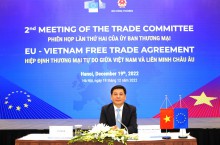The News
Trade policy updates in Kazakhstan
Regarding import taxes, as part of its accession to the WTO in 2015, Kazakhstan has agreed to gradually reduce 3,512 tariff lines, to an average of 6.1% by 2020. Tariff on agricultural products experienced the largest decrease, from 16.7% to an average of 7.6%. In January 2016, Kazakhstan started to impose lower tariff rates on certain food products, cars, airplanes, lumber, alcoholic beverages, pharmaceuticals, freezers and furniture, jewels.
Regarding import taxes, as part of its accession to the WTO in 2015, Kazakhstan has agreed to gradually reduce 3,512 tariff lines, to an average of 6.1% by 2020. Tariff on agricultural products experienced the largest decrease, from 16.7% to an average of 7.6%. In January 2016, Kazakhstan started to impose lower tariff rates on certain food products, cars, airplanes, lumber, alcoholic beverages, pharmaceuticals, freezers and furniture, jewels.
Regarding import taxes, as part of its accession to the WTO in 2015, Kazakhstan has agreed to gradually reduce 3,512 tariff lines, to an average of 6.1% by 2020. Tariff on agricultural products experienced the largest decrease, from 16.7% to an average of 7.6%. In January 2016, Kazakhstan started to impose lower tariff rates on certain food products, cars, airplanes, lumber, alcoholic beverages, pharmaceuticals, freezers and furniture, jewels.

In 2018, Kazakhstan's most-favored nation (MFN) tariff rate was 7.1%. Kazakhstan applies a zero tariff rate on about 1,900 tariff lines, including livestock, pork, fish products, chemicals and pharmaceuticals, cotton, textiles, machinery and equipment, medical vehicles and some aircraft types. Kazakhstan's average WTO binding tariff rate is 10.6% for agricultural products and 6.4% for non-agricultural products. Kazakhstan's maximum WTO binding tax rate for industrial products is 19%, while the maximum WTO binding tax rate for agricultural products is 50%.
Regarding import procedures, all goods entering the customs territory of Kazakhstan must be declared and cleared at approved clearance points. The goods must be fully declared within 30 days from the date of arrival, while summarized information of the goods must be declared and notified to the customs office within 24 hours after the goods cross the border and are brought to the warehouse. Except for cases which are allowed simplified procedures, the customs declaration must be filed by a Kazakh legal entity - that is, a business entity registered under Kazakhstan law, or its branch or representative in Kazakhstan, an individual entrepreneur registered in Kazakhstan, or a permanent resident of Kazakhstan. Foreign legal entities cannot deal directly with customs authorities in Kazakhstan and are required to use the services provided by licensed customs brokers.
For free circulation of goods, submitting a paper and electronic customs declaration (one copy for each shipment), as well as accompanying documents are required. The Customs Goods Declaration (5 copies) must be in Kazakh or Russian languages. Other documents may be submitted in a foreign language. However, a customs officer has the right to request a translation of such documents into Kazakh or Russian as well as a notarization of the translation. In addition to the customs declaration documents, another documents including invoices, goods supply contracts, import and export transaction passports and transportation documents (eg. e.g. bill of lading, air way, etc.) may be required to submit. The transaction passport is the main tool for monetary control system. Transaction passports are filled out by the exporter/importer and reviewed by customs officials and representatives of the exporter/importer's bank.
Certain items are not accepted, stored, transported, or imported to Kazakhstan for legal, safety reasons or others.
Transactions involving the following items are prohibited or restricted from entering Kazakhstan, regardless of origin: antiques, oil products, art works, batteries, biologically hazardous products, chemicals , cosmetics, alcohol, paints, perfumes, tobacco, corrosives, credit cards, dangerous goods as defined by the International Air Transport Association (IATA), opium or hashish smoking devices and tobacco mixes, prescription drugs, fire extinguishers, combustibles, furs, gambling equipment, gas, graphite products, wet stones, infectious substances, magnetized materials, precious metals, military equipment, oxidizing agents, personal effects, poisons, political materials, precious stones, psychotherapeutic substances, radioactive materials and tobacco products.



